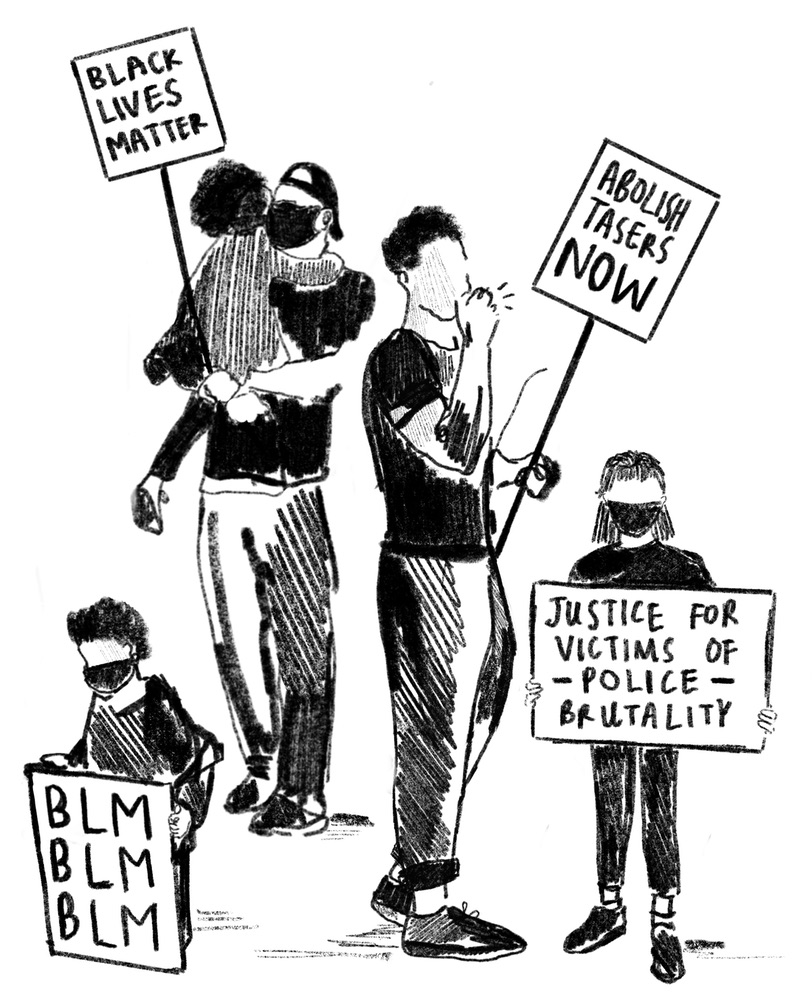Policing by consent
Taser usage in Greater Manchester
“They treated him like an animal. They didnʼt go to see him like he was a person needing help... They just thought he was another Black lad, he was nothing. And when you live on a council estate you are absolute trash.”Novlyn Graham
(ITV News, 2019)
This article was originally published in STAT - ISSUE 02.
There is a widely held belief that crime is something we should be ʻtoughʼ on; that itʼs something to be ʻstamped outʼ. The aim of this is to allow us to live in a free, fair and safe society - but our current system of policing may not be equipped to provide this, and may even be seen to make things worse.
As citizens, we grant the government implicit permission to ʻpoliceʼ us - we give up personal freedoms, usually under the guise of principles like protection and justice - in exchange for a safe and orderly society. In principle, this sounds a fair deal. But as the recent growth of the Black Lives Matter movement demonstrates, this is a system which does not work for everyone.
Concerns of police brutality should not be confined to US or Metropolitan police; it is an issue within everyoneʼs interests when making the case for a fair society. In Greater Manchester, Taser usage has increased 73% in the last year alone - exceeding the national average - with Black people subject to Tasers at nearly 4 times the rate of White people. Raising concerns is Resistance Lab - a collective of scholars, academics, activists & community groups working to confront state violence in Greater Manchester. Calling for the abolition of Tasers, Resistance Labʼs report, ʼA Growing Threat to Lifeʼ, details Taser use on children and people with physical and mental disabilities, also documenting a study from Cambridge University suggesting that the mere presence of a Taser (or weapon in general) increases, rather than decreases, the likelihood of violence to both officers and members of the public.
Is disproportionate Taser usage of GMP on Black people a sign of a fair society? Is the escalation of violence (sometimes resulting in death) the hallmark of an orderly community? I would suggest not.
Now, rather than shrugging off these problems as the result of a few ʻbad-appleʼ officers, itʼs time we re-evaluated the very concept of policing. What are we doing, and why are we doing it? Calls to ʻdefund the policeʼ are initially laughed off as unthinkable, and in the present moment, this is understandable; but what this motto attempts to suggest - over the long term - is the prioritisation of support: compassion above punishment. Numerous studies suggest a link between income and crime, so, if we were to apply a universal principle of support, allow everyone the space to develop a stable and comfortable life, then perhaps this would be a more effective way of crime reduction than oppression and intimidation.
Further reading...
Are Prisons Obsolete? (2003) - Angela Y. Davis
(available online and from Manchester borough libraries)
Resistance Lab (2020). A Growing Threat to Life: Taser Usage by Greater Manchester Police. Manchester, UK. Retrieved from: resistancelab.network/taser-report
words Pete Mercer, STAT
images Hawwa Alam (via Resistance Lab report)


